
Turkish chain English Home, which sells home goods and decor, is ending its operations in Ukraine and beginning the process of transferring its retail spaces to a local franchise partner. The reasons for this are a decline in the number of customers, falling sales, and high rental costs, according to NV Business.
According to the publication, the chain’s main target audience was women aged 20-40 with children, and with the start of the war, a significant part of this group left the country, which led to a decline in demand. At the same time, the operating company in Ukraine, EHM Ukraine LLC, managed to show revenue of UAH 281.6 million in 2024, which is 4.1% less than in 2023. At the same time, the annual loss reached UAH 43.1 million, which is 47.5% more than in the previous year.
One factor complicating business operations is that the British brand’s stores are located primarily in premium shopping centers, where rental rates remain high and are not offset by the decline in customer traffic. As noted by Yavuz Bekar, Director of International Sales at English Home, “our business operations in Ukraine were not profitable.”
English Home was founded in Turkey in 2008 and is managed by Turgut Aydın Holding. The brand offers collections of British-style home textiles and decor in pastel and muted shades. As of October 2020, there were 33 retail outlets in Ukraine.

Turkish electric car manufacturer TOGG (Türkiye’nin Otomobili Girişim Grubu) has announced its entry into European markets and the introduction of new digital solutions, including the option to pay for cars with cryptocurrency, according to Autogeek.
According to the report, the company plans to open its first showrooms in Germany, the Netherlands, and Switzerland in 2025, as well as begin sales in other EU markets.
TOGG has already introduced the T10X electric crossover in Europe, which will be the brand’s first mass-produced export vehicle.
Buyers will have access to the innovative digital platform “Trumore,” through which they can place an order, select a configuration, and pay for their purchase — including using cryptocurrency or tokens issued within the TOGG ecosystem.
According to the company’s management, the integration of blockchain payments reflects its digitalization strategy and opens up new opportunities for users by combining electric mobility, fintech, and smart infrastructure.
“We are not just building a car, but a digital ecosystem where transportation, communications, and finance are combined into a single platform,” said TOGG CEO Gürcan Karakaş.
The company already produces electric vehicles at its plant in Gemlik (Bursa province). Production capacity is designed for 175,000 cars per year, with plans to increase this to 1 million units by 2035.
TOGG sees its entry into Europe as a strategic step towards promoting Turkish technology and integrating into the EU market.

In terms of total trade volume, Ukraine cooperates most closely with China, Poland, and Germany. These countries form the basis of the state’s foreign economic relations, exerting a critical influence on imports and exports.
China remains the leader with a total trade volume of $8.99 billion. Poland ranks second with $6.04 billion, while Germany and Turkey are almost equal with $4.28 billion and $4.25 billion, respectively. The United States ranks fifth with $2.86 billion.
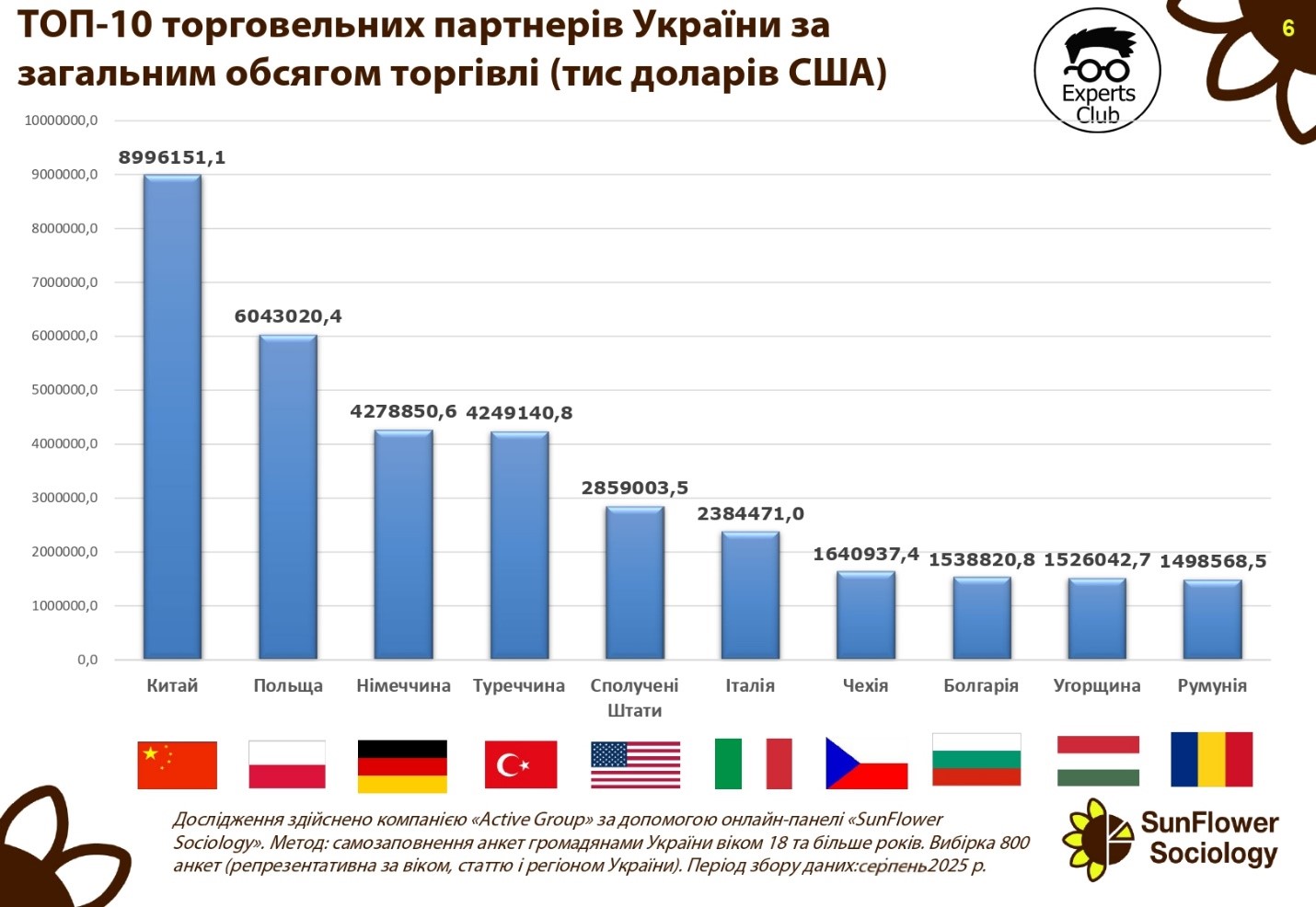
The top 10 also includes Italy ($2.38 billion), the Czech Republic ($1.64 billion), Bulgaria ($1.54 billion), Hungary ($1.53 billion), and Romania ($1.50 billion).
“The top ten partners form the basis of Ukraine’s foreign trade balance. China and the EU countries account for the largest volumes of trade, but it is important to take into account the significant negative balance in relations with these countries,” said Maksim Urakin, founder of Experts Club and economist.
He added that although the large volume of trade indicates Ukraine’s integration into global supply chains, dependence on imports from China and Europe creates strategic risks.
“Poland and Germany are key hubs for Ukrainian exports, but at the same time they are significant sources of imports. Therefore, it is critically important to balance trade flows, preserving positive sectors such as agriculture and metallurgy, and reducing dependence on critical imports,” Urakin noted.
BULGARIA, CHINA, CZECH REPUBLIC, ECONOMY, EXPERTS CLUB, FOREIGN TRADE, GERMANY, HUNGARY, ITALY, POLAND, ROMANIA, TURKEY, UKRAINE, USA, МАКСИМ УРАКИН
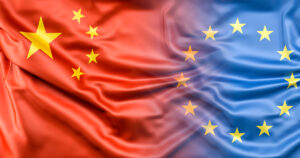
China remains the undisputed leader among Ukraine’s trading partners in terms of import volume. In the first six months of 2025, Ukraine imported Chinese goods worth US$8.15 billion. This is more than twice the figures for Poland ($3.58 billion) and Germany ($3.18 billion), which ranked second and third, respectively.
High import volumes were also recorded from Turkey ($2.53 billion) and the United States ($2.31 billion). Italy, the Czech Republic, Slovakia, Bulgaria, and France round out the top ten key suppliers with volumes ranging from $1.2 billion to $979 million.
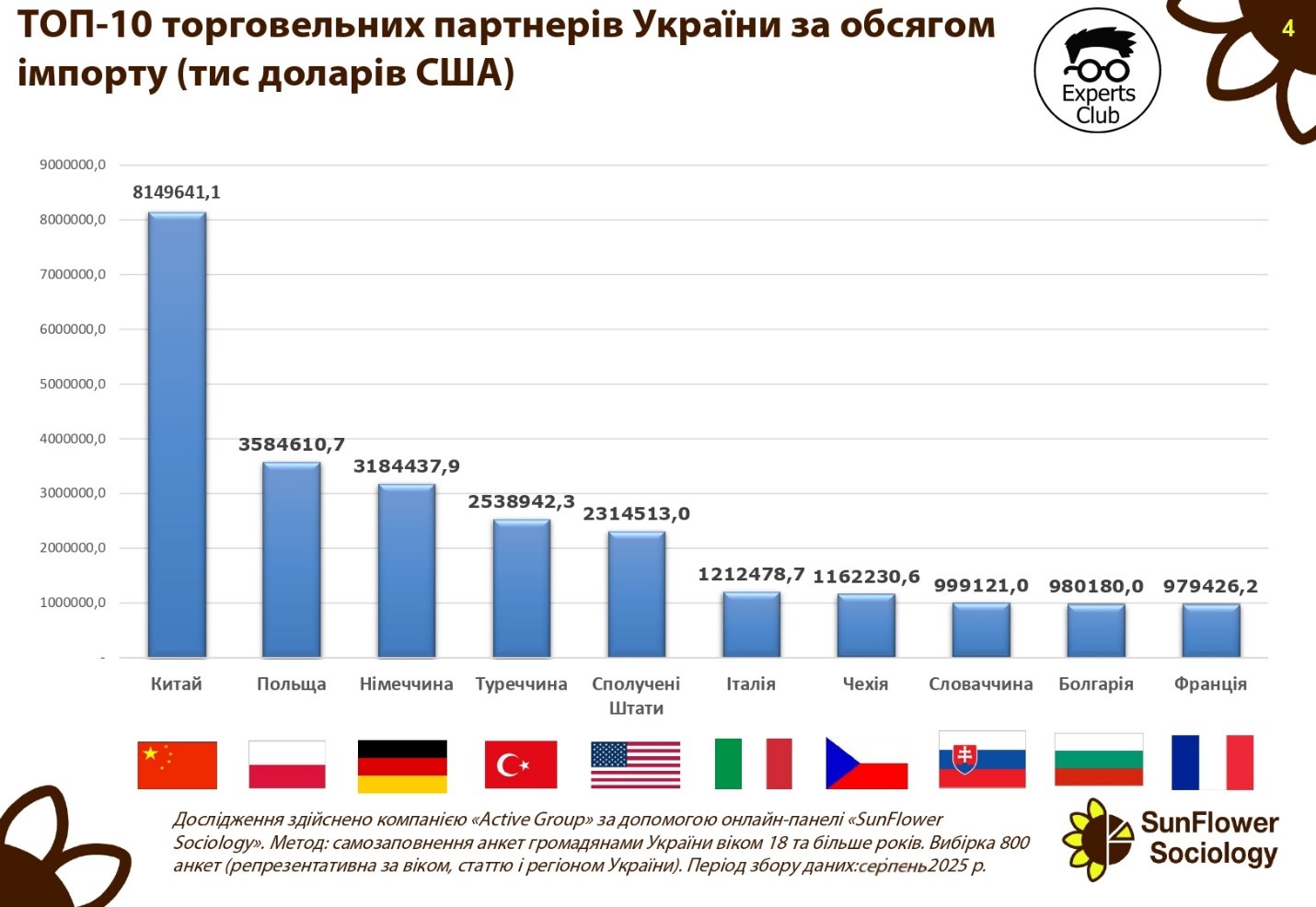
“The formation of such an import structure indicates Ukraine’s excessive dependence on Chinese goods, especially in the electronics, technology, and industrial products segments. Such an imbalance poses risks to economic stability, as any political or logistical restrictions will immediately affect the domestic market,” emphasized Maksim Urakin, founder of Experts Club and economist.
At the same time, experts point to the diversification of supplies from European Union countries. Poland, Germany, Italy, and France together account for more than $8.5 billion in imports, forming a significant segment of the domestic consumer and industrial market.
Economists predict that, provided the hryvnia exchange rate remains stable and import flows continue at current levels, the trade deficit with China will continue to grow. This will require an adjustment of state trade policy towards stimulating domestic production and searching for alternative markets.
ACTIVE GROUP, CHINA, ECONOMY, EU, EXPERTS CLUB, GERMANY, IMPORTS, POLAND, SunFlower Sociology, TRADE BALANCE, TURKEY, UKRAINE, USA, МАКСИМ УРАКИН
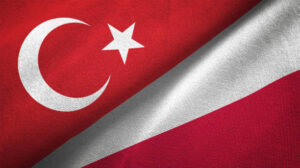
According to the results of the first half of 2025, Poland remains Ukraine’s main trading partner in terms of export volumes. According to research by Active Group and Experts Club, exports to Poland amounted to US$2.45 billion.
Turkey ranks second with USD 1.71 billion, and Italy ranks third with USD 1.17 billion. Other major partners include: Germany ($1.09 billion), Spain ($976 million), the Netherlands ($919 million), China ($847 million), Egypt ($776 million), Romania ($679 million), and Hungary ($652 million).
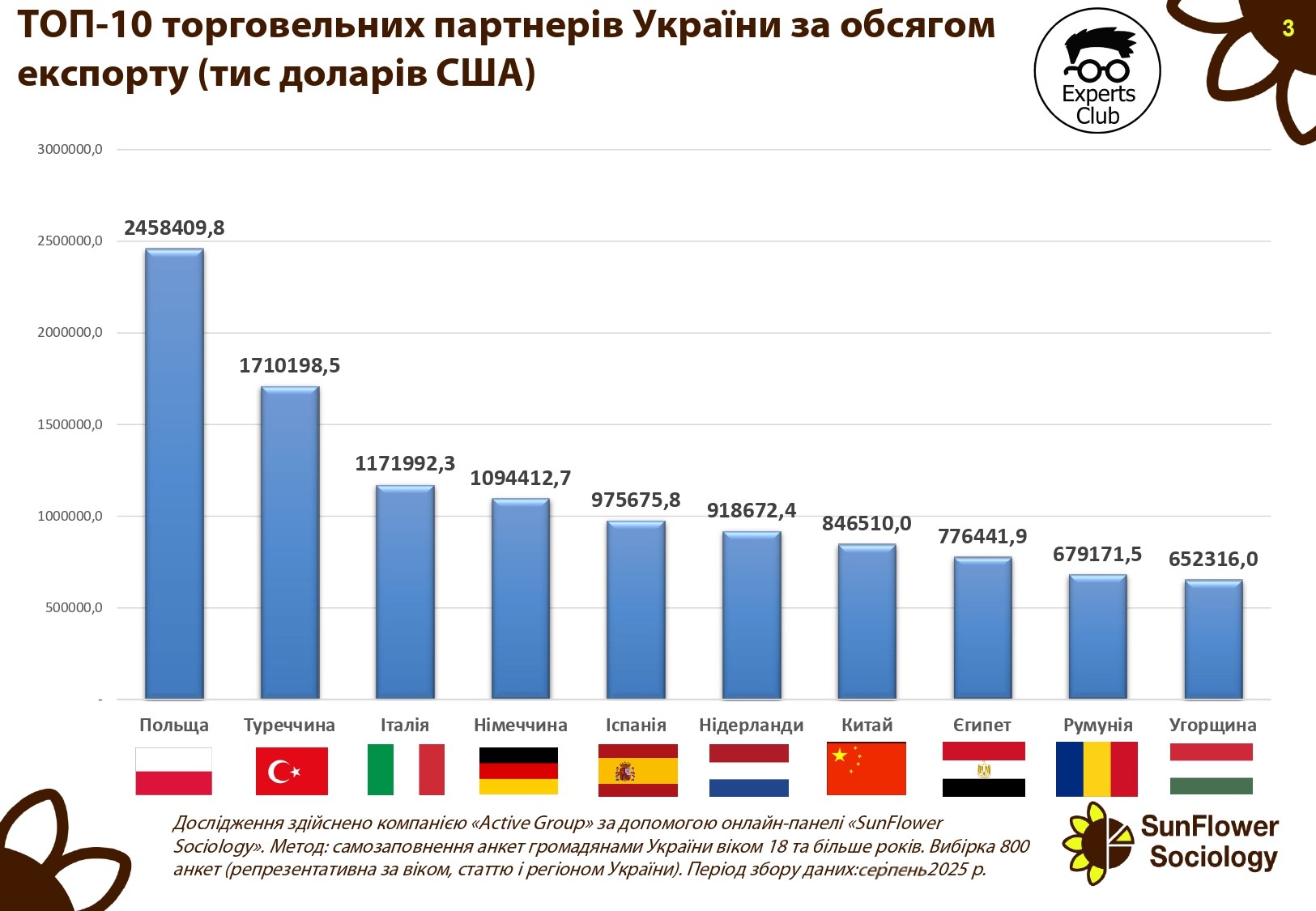
“The structure of Ukraine’s exports shows a clear focus on European Union countries. Poland, Italy, Germany, Spain, and the Netherlands together account for more than half of total exports. This indicates Ukraine’s strategic integration into the European economic space,” emphasized Maksim Urakin, founder of Experts Club and economist.
He also noted that Turkey remains a critically important partner for Ukrainian agricultural and metallurgical exports, while China and Egypt are key markets for agricultural products, particularly grains.
“The presence of trading partners such as Egypt and China diversifies Ukrainian exports,” Urakin added.
CHINA, ECONOMY, EGYPT, EXPERTS CLUB, EXPORTS, GERMANY, HUNGARY, ITALY, POLAND, ROMANIA, TRADE, TURKEY, UKRAINE, МАКСИМ УРАКИН
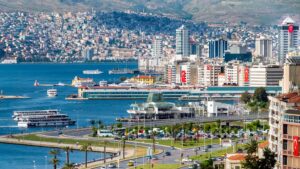
Ukrainians ranked fourth among foreign buyers of real estate in Turkey in August 2025, according to data from the Turkish Statistical Institute (TurkStat). In the last month of summer, foreigners purchased 1,810 residential properties in Turkey, which is 19.8% less than in August 2024 (2,257 properties). The share of sales to foreigners amounted to 1.3% of the total volume of transactions.
Leaders in terms of the number of transactions in August:
Russians — 283 properties;
Iranians — 155;
Germans — 118;
Ukrainians — 118;
Iraqis — 118;
Azerbaijanis — 77;
Kazakhs — 68.
The most popular regions among foreign buyers were Istanbul (671 properties), Antalya (576), and Mersin (123).
The report notes that Russians remain the leaders, but their activity is declining: in August, they bought 10.2% fewer properties than in the previous month (315 in July). Compared to August 2024 (381 transactions), the decline was 25.7%.